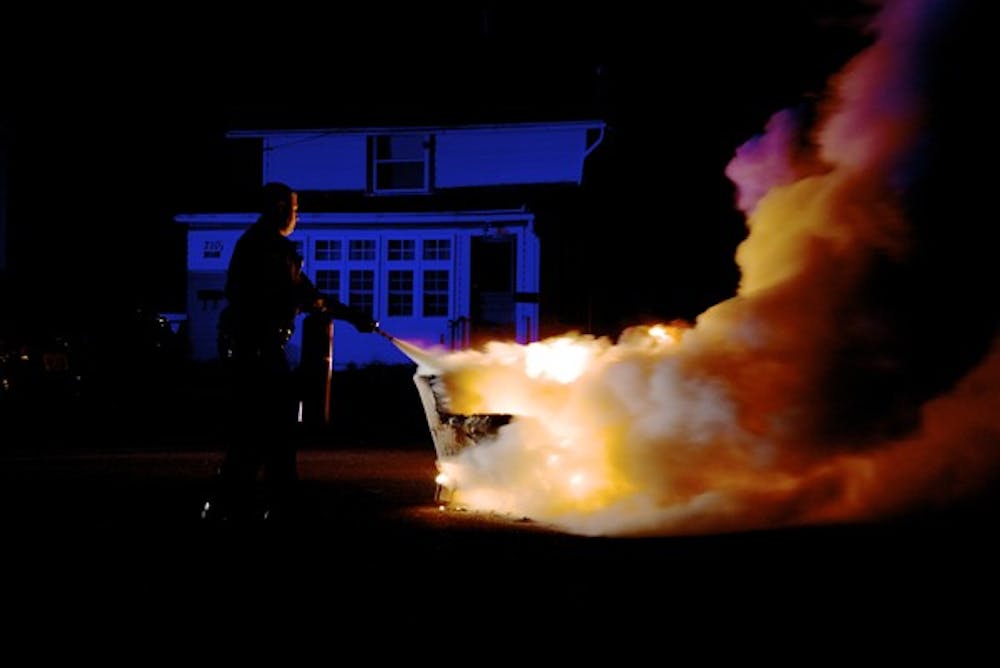Putting out the fire: City enacts emergency ordinance to discourage student fires
In conjunction with an emergency city ordinance issued Monday to discourage city-wide couch burnings, Central Michigan University President George Ross took a decisive stance on the issue.
During an exclusive interview with Central Michigan Life, Ross told reporters that the university supports the city's decision to take action "100 percent."
"We’ve been neighbors for a century plus, we have a great responsibility to this community," Ross said. "I expect students, faculty and staff to act responsibly and treat it like their home."
Ross characterized the mentality of setting fires to blow off end-of-the-year steam as careless and disrespectful.
"Anybody romanticizing destruction of property and putting people in danger I have no respect for," Ross said.
Mount Pleasant Mayor Sharon Tilmann warned Central Michigan University students that destruction and arson will not be tolerated by city and university officials.
"We are looking for any and all ways to curtail the outrageous behavior that's happening in our city," Tilmann said. "It's getting out of hand."
The city’s planning commission unanimously approved an emergency ordinance to further discourage students from lighting fires at end-of-the-semester celebrations over the last few years. The ordinance would charge those within 300 feet of an open fire with a misdemeanor.
The emergency ordinance is coupled with the already existing outdoor burning regulations which states "no person shall kindle or maintain any bonfire or rubbish fire or permit any such fire to be kindled or maintained within the city limits."
Outdoor recreational fires such as bonfires, fires in chimneys made of clay, or ground fires confined in metal containers are prohibited, unless a permit for usage is approved in writing by the fire code official. Fire Chief Gregory Walterhouse said exceptions, however rare, are made for ceremonial fires and religious organizations.
Violating the code is a misdemeanor crime with a $500 fine or 90 days in jail.
"This time of the year we see dumpster fires," Walterhouse said. "In just the last couple of years, we’ve seen the furniture fires. It's something relatively new."
A dangerous tradition
Burning couches has become more frequent at CMU in recent years. Other campuses have witnessed increases in burnings and riots as well. Michigan State University's took place in 1998, 1999, 2005 and 2013 when the Spartans made it to the Rose Bowl.
Ross sent an email to the student body Tuesday urging students to act responsibly and walk away from large gatherings. He said that this email was not connected to the events of the previous weekend.
Tom Idema, director of student conduct, said those involved with prior furniture burnings have been suspended for violating the Code of Student Rights, Responsibilities and Disciplinary procedures. The university works closely with the city and local law enforcement to inform students of the code and city ordinances.
"Nobody should be setting fires," Idema said. " Nobody should be standing around watching students setting fires. Don’t be a bystander and let these things go on. If we find the students who are involved in these things, we’ll put them through the Code of Conduct process, be them a first-year freshman or a senior getting ready to graduate in a few days."
Ross said whether students are physically on campus or out into the community, they are still subject to the Code of Conduct at CMU and those penalties still apply.
Tilmann said the ordinance was based on a similar one from Lansing, and the city commissioners would be looking for others to adopt for Mount Pleasant.
"It shouldn’t be a college tradition of destruction," Tilmann said. "I have to wonder, what kind of mind would think that it is the tradition to destroy and trash a neighborhood? That’s not tradition, it's irresponsible and inexcusable."
These fires may seem harmless to students, however Walterhouse said the potential of the flames getting out of control or someone getting injured is high, especially when the fires draw large congregations of students.
An emergency ordinance can be passed immediately if it garners two-thirds of the commission’s vote and will remain effective for 60 days, long enough for the commissioners to discuss the problem further.
Tilmann said she would not be surprised if the ordinance would lead to a more permanent solution after the 60 day period.
"I think that the anger and the disappointment stems from the fact that there are people who live in this community year round, this is our home," Tilmann said. "The very idea that there are individuals who would come into this community and trash it is absolutely outrageous"





